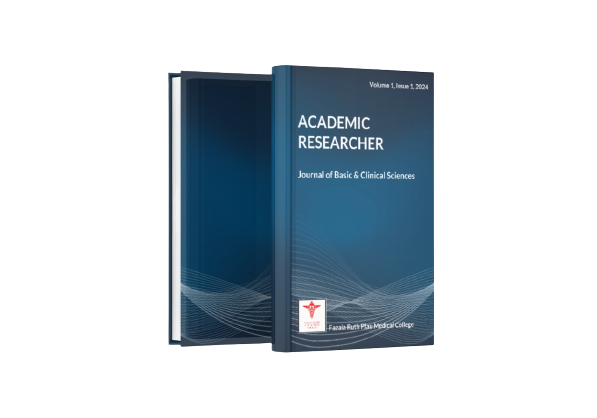

Academic Researcher
Journal of Basic and Clinical Sciences
Volume 03, Issue 01, 2026
An Official Journal of Fazaia Ruth Pfau Medical College, Air University
ISSN: 3008-0495 (Online)
ISSN: 3008-0487 (Print)
Association of Genotypes and Alleles of Adiponectin Gene in Type 2 Diabetes Mellitus: A Cross-Sectional Analysis
Asif Memon
Acad Res. 2025; 2(1): 19-26
DOI:https://doi.org/10.70349/ar.v2i1.26
Abstract
Objective: The aim of the study was to find out the association between genotypes as well as the allele frequencies of ADIPOQ (Adiponectin gene) and its predisposition to Type 2 Diabetes Mellitus (T2DM), by comparing affected individuals with non-diabetic controls.
Methods: The study was conducted at Ziauddin University Hospital, Karachi, over the period from January 2018 - 20. A cohort of participants (200) was recruited, comprising 100 patients diagnosed with T2DM and 100 age-matched non-diabetic controls, aged between 25 and 65 years. Following informed consent, relevant demographic information, medical history, and associated risk factors were meticulously documented. PCR was used to determine the Genotypic and allelic distributions of the ADIPOQ gene. SmaI restriction enzyme was used for RFLP analysis.
Results: Within the diabetic cohort, 67% exhibited the TT genotype, as opposed to 79% in the control group, statistically it was not significant (p=0.16). Nevertheless, a significant divergence was observed in allele frequencies: the T allele was present in 81% of diabetics compared to 89% of controls, whereas, 19% of diabetics and 11% of controls had G (p < 0.05). Occurrence of allele G in the diabetic group was notably higher. The odds ratio calculated for the T allele was 0.581(95% CI:0.334–1.011), whereas, for G allele it was 1.72 (95% CI: 0.988–2.99).
Conclusion: The allele T of Adiponectin gene may confer a protecting effect for non-diabetic individuals, however, allele G showed association with an increase in risk of developing T2DM. Future researches with larger and more diverse cohorts, be undertaken to substantiate these observations.
Keywords
Genetic Polymorphism, Restriction Fragment Length Polymorphism (RFLP), Adiponectin Gene, Type 2 Diabetes Mellitus.








